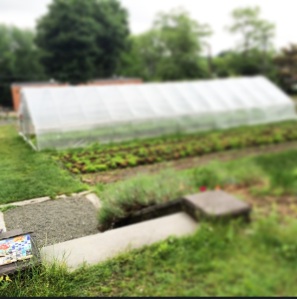
Audience Navigation
Utility Navigation
Student Blogs
The Visits: “Regional Environmental Council” and “Yale Farm”
It has been amazing to actually have time to sit down and read, and this time around I am following my own ‘syllabus.’ Besides our initial goal to spend the first three weeks doing literature reviews, we also got the amazing opportunities to meet with the coordinator for the Urban Garden Resources of Worcester (UGROW) program under the Regional Environmental Council (REC) in Worcester, and a day trip to Yale University to meet with the director of “The Yale Farm,” on Friday. I will post a separate blog entry about the two visits later this week!
Thursday June 12th: We met with the coordinator of (UGROW) to discuss our potential roles with the organization. Matt and I, along with our advisers, believed that getting hands on experience would give us tremendous insight on the basic knowledge in community farming. In addition, we got to hear some amazing new projects that UGROW is currently working on. It would be great to be able to get involved, especially in something that is still in the midst of being fulfilled. Getting a front row seat in how a community garden is created, not only would allow show us the basic methods in beginning a garden, but we would be able to scout out the partners in the community that would help us move forward—and that is key. Building connections is probably the most crucial aspects of starting any new venture.
Friday June 13th: Although Matt and I were planning for the end of June to make our college visits, we were more than happy to have the chance to go down to Yale University. The director of Yale Farm was simply wonderful. I have to admit I did do some research before we headed down there—and without a doubt the Yale Farm’s director is extremely knowledgeable.
We left around 9 AM Friday morning, and unfortunately we were greeted with a downpour, but that didn’t dampen our excitement. By 1130 AM we arrived in New Haven, CT and boy did I fall in love with the city. The streets were pristine; several shops and cafes on every street corner, and at the same time there was this nice quaint atmosphere that made you forget that you were in a city to begin with. I wish I was able to take some pictures, but the rain was unbearable by the time we got there.
Before our meeting, Matt’s sister, who works in the area, was kind enough to take us out for lunch. The place she picked aligned with our mission of sustainability quite well. It was called, Claire’s Corner Copia, a vegetarian restaurant established since 1975, with a motto declaring: ‘good ingredients for a better world’–quite humbling and inspiring, I think. As for their food… delish–homemade lavender lemonade? Yes, please. So, if you’re in the area I would highly recommend :>
Now, getting down to business, after our meeting with Yale Farm’s director it dramatically changed our course of action. It might sound upsetting, but Matt and I are extremely grateful that we came to this realization early on. I don’t really want to go into too much detail, since there’s a lot I can say, but it was clear that we need to revise our strategy.
Initially, we have outlined our proposal as such:
Part I: Why Garden and the Benefits of Community Gardening—this ranges from an ethical, social, political, and academia standpoint. More importantly, since the proposal will be introduced to the faculty members and administration at Holy Cross, we need to show them that the mission of the college fully supports a community garden.
Part II: Case Studies—this consists of doing case studies of other colleges that is similar to Holy Cross, in order to show the basic logistics in gardening methods, how to organize garden staffs, what steps did they took to get their garden implemented, and so forth. Matt and I envisioned creating a chart-like form to showcase each college’s methods, hoping that it will provide us a variety of ways Holy Cross can structure their garden.
What We Learned: We need to put more emphasis on how the garden reflects the College’s mission statement. That means creating real excitement on campus and gaining support from students, faculty members, administrations, alumni, and even parents. Even though providing the administration a detailed outlined of the methods and logistics that goes into gardening is useful—the bottom line is, it’s more important to showcase the urgency or the need of implementing one. Some ideas Matt and I thought of were creating a detailed poll that will be distributed to the student body, or an event that would be exhilarating to the campus and community. A strong foundation is the answer.




